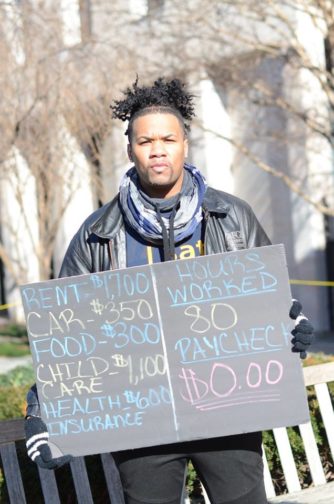
WASHINGTON—President Donald Trump called 50,000 federal workers back to their jobs, but without pay, even as the costs of his lockout/shutdown of their agencies and others hit $1 billion a week.
The cost is so high that now even Trump’s own top economist admits it could end U.S. economic growth and potentially send the nation into recession.
In a study, the Center for American Progress puts the overall cost to the economy of Trump’s shutdown at $2 billion every two weeks, figuring 2-week pay periods for the 800,000 affected workers alone. That’s a billion bucks a week.
Trump ordered a shutdown of Cabinet departments—including Agriculture, Commerce, Housing, Interior, Justice, and Transportation—plus many other agencies, notably the Environmental Protection Agency, starting at midnight on Dec. 21 because he opposed congressional money bills to fund them.
Other departments and their workers, notably at the departments of Defense, Education, Labor, and Health and Human Services, have been funded. But another Trump order cancels pay raises for all two million federal workers, regardless of whether they’re locked out, paid, unpaid, working or not.
As anti-government, anti-worker White House advisors—ideologues previously employed by right-wing think tanks—egged him on, Trump gleefully took credit for the shutdown/lockout. He refused to sign any money bills until and unless lawmakers bowed, scraped, and gave him $5.7 billion to build his controversial Mexican Wall.
The Democratic-run House refuses to do so and passes repeated money bills without the wall. House Speaker Nancy Pelosi, D-Calif., calls the wall “immoral,” and other foes call it racist. But Senate Majority Leader Mitch McConnell, R-Kent., is sitting on the money bills, saying he won’t bring up anything Trump won’t sign—and that whatever he signs must include the Mexican Wall.
That leaves the workers locked out. But Trump’s latest recalls, of food safety inspectors and 40,000 IRS workers, among others, total 50,000 workers. Nevertheless, some 350,000 federal workers are locked out of their offices and 450,000—including the airport screeners, the food safety inspectors, and the air traffic controllers—are still working without pay.
Their unions tried, so far unsuccessfully, to get all of them back on the job, with pay.
On the afternoon of Jan. 15, a federal judge in D.C. ruled against a request by two of the unions, the Air Traffic Controllers and the Treasury Employees, for an immediate injunction ordering Trump to reopen the government and pay the workers, who have now gone unpaid for 26 days. But the judge set a Jan. 31 hearing date for their underlying suit, claiming Trump violates the U.S. Constitution by depriving workers of property: Their earned paychecks.
A typical unpaid worker has missed paychecks totaling $5,000 so far. That ranges from average pay of $12,500 for Securities and Exchange Commission workers—who are supposed to ride herd on Wall
Street’s financiers and finaglers—to $4,446 for Agriculture Department workers, including the food safety inspectors.
And those figures don’t count the tens of thousands of other “contractor” workers in federal buildings, such as janitors who clean them and fast-food workers who work in federal building cafeterias and food courts to feed them. They’re locked out and unpaid, too, and in past GOP lockouts, they never recovered.

They also don’t count the impact on non-federal workers who rely on the feds for key functions—such as grocers who need FDA inspectors to make sure food is safe, and farmers who can’t get loans to buy seed and fertilizer to plant crops.
Pelosi, who leads the opposition to Trump’s Mexican Wall, cited the farmers in inveighing against the lockout/shutdown.
“They are struggling because of plummeting prices, a tough farm economy, and the damage of the administration’s trade brinkmanship, but President Trump refuses to re-open the Department of Agriculture,” she said. “The president continues to hold farmers’ and producers’ financial security and well-being hostage to an ineffective, wasteful border wall, as he perpetuates the longest shutdown in American history.”
Meanwhile, Kevin Hassett, chair of Trump’s Council of Economic Advisers, finally admitted his boss’s lockout/shutdown could end U.S. growth and the slow recovery from the Great Recession, also known as the Bush Crash.
Hassett said CEA lowered its gross domestic product estimates for the second quarter of the fiscal year. He didn’t put a number on it, but the Center for American Progress said Trump’s CEA lowered growth by 0.1 percent—or $5 billion—so far. Independent economists say that’s optimistic, the center added.
Hassett conceded the lockout/shutdown causes “a lot of pain. You know at CEA, you know none of our staff are being paid. A lot of our folks have been furloughed. We’ve got one staffer that told me over the weekend that she’s starting to drive an Uber to help make ends meet.”
Hassett acknowledged that when workers don’t get paid, there are “permanent hits to consumption.” While he didn’t say so, consumer spending accounts for 70 percent of the economy. And it suffers, he said, because unpaid workers curtail spending on things like food, restaurants, and clothes. That spending decline hurts workers in those businesses, too.










